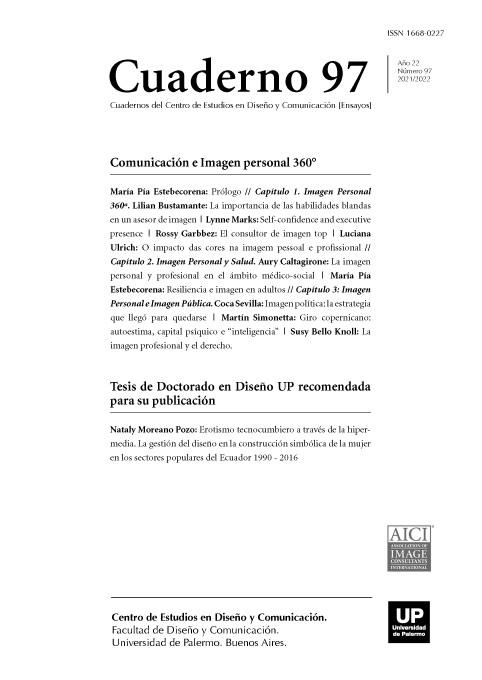Giro copernicano: Autoestima, capital psíquico e “inteligencia”
Abstract
This paper reflects on the link between the level of self-esteem, “psychic capital” and performance in the pursuit of happiness of people. The concept of “psychic capital” has been developed by Martina Casullo, referring to the school of positive psychology in Argentina, founded on a global level by Martin Seligman. From this perspective, self-esteem will play a determining role when it comes to strengthening or restricting the achievement of individuals’ goals.
It is a great honor to share these reflections within the framework of the present publication of an institution as prestigious and influential as the University of Palermo. In this framework, we will refer to the way in which self-esteem is linked to the psychic capital of people and the way in which they enhance the use of the “neurological stock”, which we usually call “intelligence”.
References
Braidot, N. (2008). Neuromanagement. Cómo utilizar a pleno el cerebro en la conducción exitosa de las organizaciones, p. 47. Biblioteca Braidot, Ediciones Granica.
Gardner, H. “Multiple Intelligences”, citado por Daniel Goleman en La inteligencia emocional. Por qué es más importante que el cociente intelectual, p. 60, op. cit.
Porter, M. (1985). Ventaja competitiva. Creación y sostenimiento de un desempeño superior. “Psicoeconomía. Economía de los sentimientos humanos”, escrita por Martín Simonetta y publicada por la Fundación Foro para la Salud Mental, 2014.
Casullo, M. M. (2005). “El capital psíquico. Aportes de la Psicología Positiva”. Revista Psicodebate Nº 6: Psicología y Salud. Buenos Aires.
Gardner, H. (1998). “A Reply to Perry D. Klein’s ‘Multiplying the problems of intelligence by eight’”. Canadian Journal of Education 23.
Agüera Torres, A. (2009). “División de actividades por inteligencia en educación infantil”. Revista digital Enfoques Educativos Nº 32, 15 de febrero.
Bowlby, J. (1958). “The Nature of the Child›s Tie to his Mother». International Journal of Psychoanalysis, 39: 350-371.
Antunovic, E. (2009). El mejor lugar después del vientre materno. La exterogestación y la necesidad de ser llevado.
Goleman, D. (1999). La inteligencia emocional, p. 54. Vergara Editor.
Los autores/as que publiquen en esta revista ceden los derechos de autor y de publicación a "Cuadernos del Centro de Estudios de Diseño y Comunicación", Aceptando el registro de su trabajo bajo una licencia de atribución de Creative Commons, que permite a terceros utilizar lo publicado siempre que de el crédito pertinente a los autores y a esta revista.


